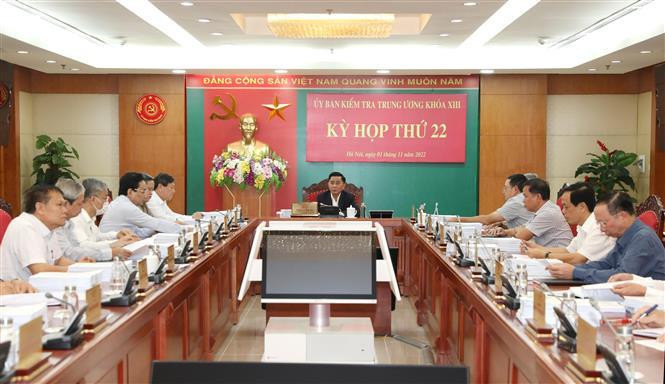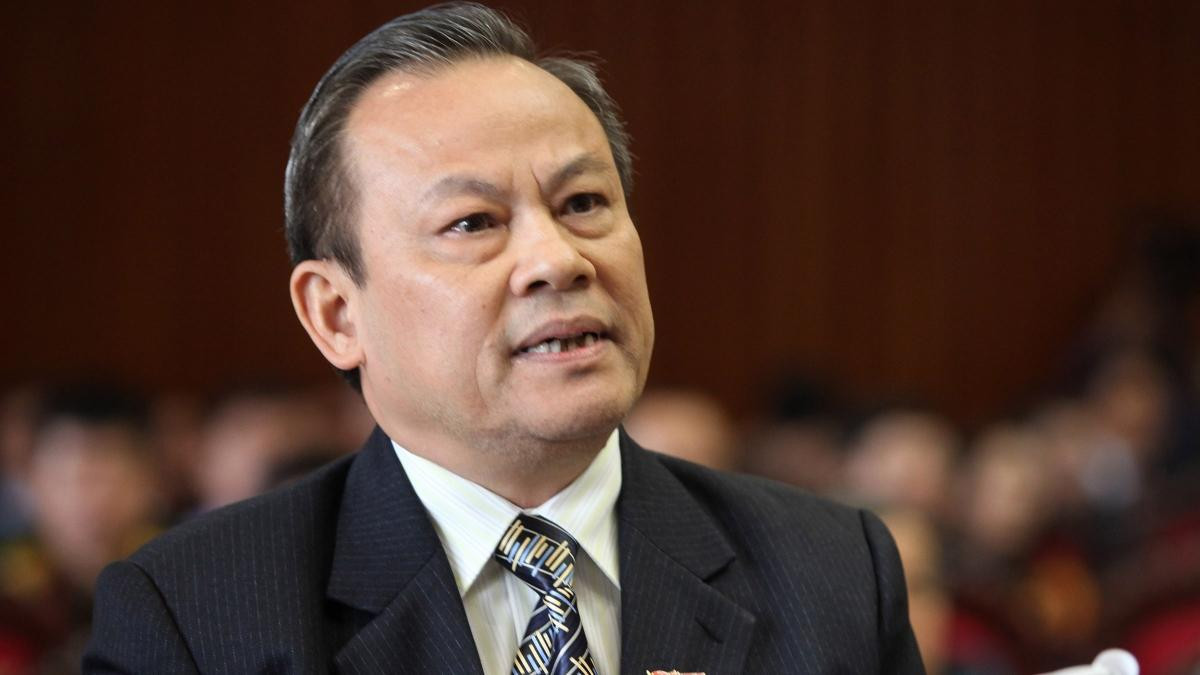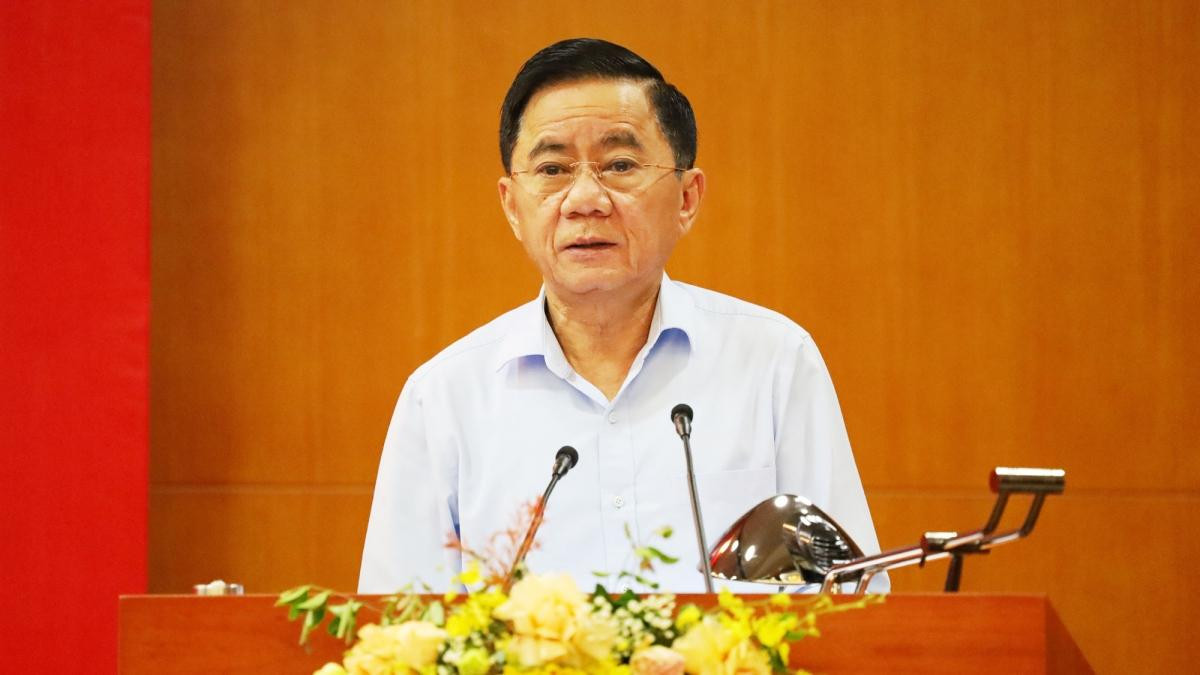Negativity persists because inspection and supervision officers are deferential, evasive, and even bribed.
Some negative incidents have been prolonged and then become serious because inspection and supervision work has not been done regularly. Even the officers doing the inspection and supervision work are respectful, evasive, and even bribed.
 |
Scene of the 22nd session of the Central Inspection Commission. Photo: Phuong Hoa/VNA |
Still respectful, evasive, afraid of fighting in inspection and supervision
In a number of recent conclusions of the Central Inspection Commission after reviewing the results of inspections when there were signs of violations against a number of Party organizations and Party members, it was found that in some places there was a lack of inspection and supervision, allowing a number of organizations and individuals to violate Party regulations and State laws in personnel work; management and use of finance, assets, public investment; land use, scientific research management; implementation of public investment projects and procurement of medical equipment and consumables...
Inspection and supervision is one of the Party's leadership methods. However, looking back at recent prominent cases and incidents, this work is being lax in some grassroots Party organizations, causing small violations to gradually accumulate into major violations, which are not promptly prevented and handled, leading to many key officials being disciplined or even caught up in legal trouble.
An official in the Party's inspection and supervision sector once said that, in principle, every Party member must participate in activities at the grassroots Party organization and perform the duties of a Party member, carry out criticism and self-criticism. But when the incident happened, a big question was how did the Party organization here play its role? Why did the Party organization not know about the violation when their comrade committed it, or did they know but did not dare to fight because of respect, avoidance, or fear of conflict? Because of the lack of democracy and the lack of struggle when there were signs of violation, the Party organization there lost its fighting power and even became paralyzed.
According to Mr. Le Van Cuong - National Assembly Delegate of the 11th and 12th terms, many scandals that have been brought to light recently, in addition to the cause of errors in personnel work and loopholes in power control, there is also the cause of the Party's grassroots organizations being lax in management, inspection, and supervision, not strictly implementing the principles of criticism and self-criticism, and still being respectful, evasive, and afraid of fighting.
 |
Mr. Le Van Cuong (National Assembly Delegate, 11th and 12th terms). Photo: Tuoi Tre |
“Some negative incidents were allowed to drag on, then became serious, leading to cadres not only being disciplined by the Party but also by the law, because inspection and supervision work was not done regularly and violations were not detected in a timely manner. On the contrary, there were also inspection and supervision teams that discovered them, but due to deference, avoidance, or even bribery, they were not strictly handled,” said Mr. Le Van Cuong.
Citing the case at the Vinashin economic group, a member of the 12th National Assembly said that there were 11 inspections but no violations were detected, which led to losses of hundreds of billions of dong. The question here is, what is the quality of the inspection teams? Is there any cover-up? When such violations occur, who is responsible?
“The quality of the inspection and examination teams here has two aspects. First, it is possible that due to weak capacity, violations are not detected; second, sometimes they are detected but due to deference, avoidance, or bribery, the inspection and examination results are not consistent with reality, and violations are not handled promptly,” Mr. Le Van Cuong emphasized.
Shortcomings and limitations in the work of inspection, supervision and Party discipline were also pointed out by the head of the Central Inspection Commission at the industry conference in October 2022. According to Mr. Tran Cam Tu - Chairman of the Central Inspection Commission, some Party committees, Party organizations, and heads of Party committees have not really taken seriously and have not been resolute in leading, directing and organizing the implementation of inspection and supervision tasks; the determination of subjects, contents, programs and plans for inspection and supervision in some localities and units is still scattered and formal, lacking focus and key points, not really addressing areas that are prone to violations or outstanding issues that cause frustration in localities, agencies and units that have not been inspected and supervised in a timely manner; there are also Party committees that have not yet inspected and supervised Party organizations and Party members, especially when there are signs of violations.
 |
Mr. Tran Cam Tu - Chairman of the Central Inspection Commission. |
Officers doing inspection and supervision work must have capacity, courage and integrity.
It can be seen that the inspection and supervision work of Party organizations and Party Inspection Committees at all levels in recent times has made an important contribution to the fight to prevent and repel ideological, political, moral and lifestyle degradation, manifestations of "self-evolution" and "self-transformation" within the Party, and the fight against corruption, waste and negativity.
However, compared to the requirements and reality, the situation of corruption and negativity is still complicated and obvious. Inspection and supervision work needs to be carried out more drastically, proactively, regularly, with more focus, and key points, focusing on areas where violations are likely to arise or prominent issues that cause frustration in localities, agencies, and units.
According to Mr. Le Van Cuong, in order for the inspection and supervision work to continue to promote its important role and position and become the core in the work of Party building and rectification, Party committees must set an example in performing this task, focusing on inspecting and supervising Party committee members and officials under the management of Party committees at all levels, first of all the leaders; strengthen inspection and supervision of areas prone to violations such as land management, mineral resources, finance, budget, public investment, and personnel work.
In addition to perfecting Party regulations and State laws to ensure that corruption is “impossible”, “not daring”, “not wanting”, and “not necessary”, it is necessary to regularly assess the quality of cadres and promptly remove from the apparatus those who are no longer competent and prestigious. Inspection and supervision work needs to be conducted regularly, proactively, comprehensively, objectively, publicly, and democratically; combining regular inspection and supervision with inspection for signs of violations, surprise inspections, and thematic inspections. The power given to cadres needs to be controlled by many measures; the higher the power, the more closely it is monitored and controlled.
According to the 12th National Assembly delegate, in order to improve the quality of inspection and supervision, the team assigned to be the "Sword of the Party" must be truly capable, courageous, clean and honest people.
“Subjects with corrupt and negative behaviors often have many schemes and cover up with many sophisticated tricks, so those who do inspection and supervision work must be proficient in their profession to detect them. In addition, they must have courage and not be bribed or manipulated. When violations of Party organizations and Party members are discovered, they must be strictly handled, there are no forbidden zones, all subjects are equal before the law, there cannot be “light on the top, heavy on the bottom”, only then will there be enough deterrence for violators and set an example for others” – Mr. Le Van Cuong emphasized./.
